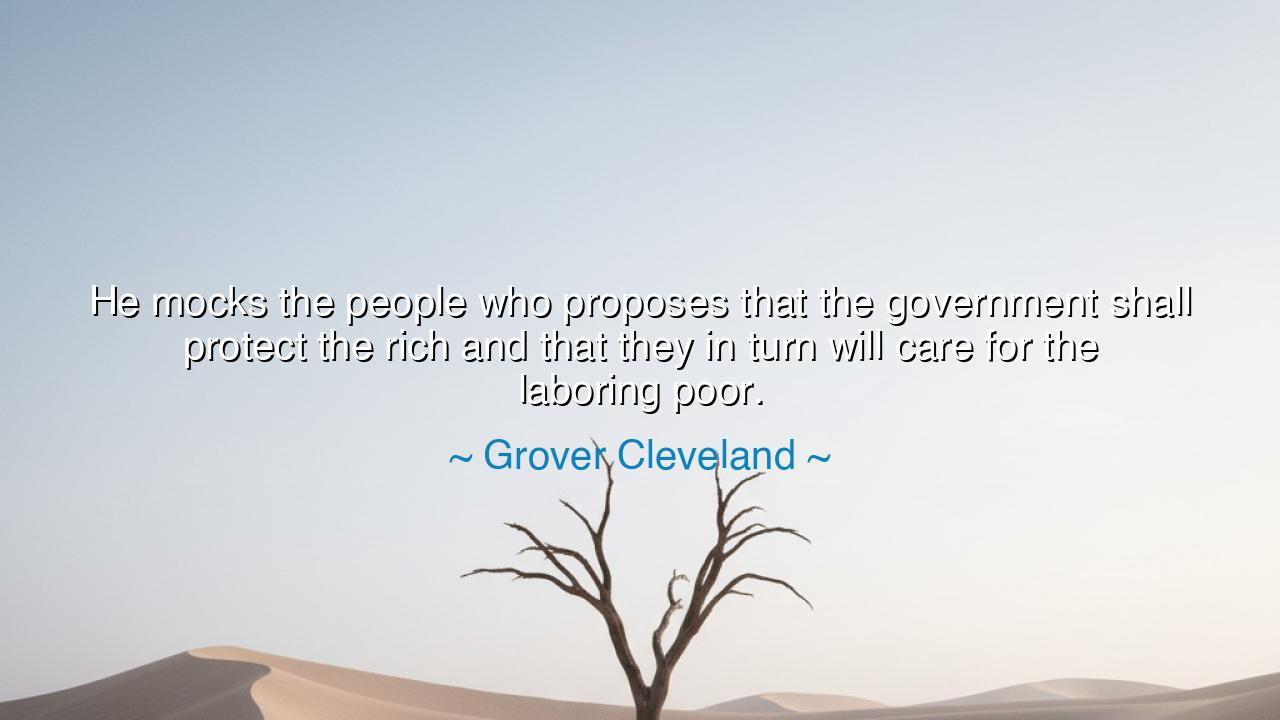
He mocks the people who proposes that the government shall
He mocks the people who proposes that the government shall protect the rich and that they in turn will care for the laboring poor.






The words of Grover Cleveland, the 22nd and 24th President of the United States, burn with a fire of moral conviction: “He mocks the people who proposes that the government shall protect the rich and that they in turn will care for the laboring poor.” In this declaration, Cleveland stands as a sentinel of justice, unmasking one of the oldest and most dangerous lies in the history of nations—the belief that if government shields the wealthy, their prosperity will somehow trickle down to nourish the poor. He calls it what it is: mockery. To protect the rich in the name of compassion is not mercy, but deceit. To expect justice from privilege unrestrained is to plant seeds of inequity and hope for a harvest of peace.
At its core, this quote is an indictment of false benevolence, the pretense that the powerful will voluntarily serve the powerless if only they are made secure in their wealth. Cleveland, a man of austere honesty and deep respect for constitutional principle, saw how easily governments could be seduced by the glitter of capital and the influence of industry. He recognized that when rulers favor the rich under the guise of stability, they do not create harmony—they create dependence, injustice, and bitterness among the working classes. His words echo across time, warning that a government that serves wealth before humanity ceases to be the guardian of liberty and becomes its betrayer.
The origin of these words can be traced to Cleveland’s presidency during the Gilded Age, a period of dazzling affluence shadowed by vast inequality. Industrial barons—railroad magnates, bankers, and monopolists—rose to enormous power, while the working poor toiled in unsafe factories for pitiful wages. Cleveland, though a conservative in temperament, saw clearly the moral rot in a government that bowed to corporate interest. He believed that the purpose of government was to protect the rights of all, not the privileges of a few. When some proposed that by strengthening the rich, the nation would prosper, Cleveland rejected this as a mockery of democracy itself. The strength of a nation, he insisted, must come from justice, not favoritism—from lifting the many, not exalting the few.
History abounds with examples that reveal the wisdom of his warning. Consider the fall of pre-revolutionary France, where kings and ministers lavished wealth upon the aristocracy while peasants starved in their fields. The government promised that noble prosperity would ensure stability, but what it bred instead was rage. When the famine came, and the people rose, no walls of privilege could protect the mighty from the fury of the oppressed. The lesson was carved in fire: a society that protects the rich at the expense of the poor builds its own ruin. The same truth has echoed in every age—from the feudal lords of Europe to the industrial elites of modern times—whenever compassion was replaced by the cold arithmetic of greed.
But Cleveland’s words also illuminate a deeper moral truth: charity cannot substitute for justice. It is easy for the wealthy to proclaim generosity while thriving under laws that keep others poor. Such “benevolence” is but a gilded chain. True justice does not rely on the goodwill of the privileged—it demands fair laws, equal protection, and honest opportunity for all. When government shields the rich and entrusts them with the care of the poor, it abdicates its own sacred duty. A republic cannot thrive on the patronage of its elites; it must rest on the dignity and independence of its citizens.
There is in Cleveland’s voice a tone of both rebuke and hope. He believed that a righteous government must stand like a wall between greed and the common good. He did not despise wealth, but he despised the corruption of power—the idea that influence or inheritance could outweigh labor, that privilege could excuse injustice. He called upon leaders to remember that the measure of a nation’s greatness is not in its fortunes but in its fairness. The rich, if they are wise, will not ask for protection from the state, but for partnership with their fellow man; and the state, if it is just, will never favor wealth at the cost of its people’s soul.
The lesson of Cleveland’s words is timeless: government exists to serve the people, not to serve power. When laws are written for the few, the many will lose faith; when justice bends to wealth, liberty begins to die. A wise citizen, therefore, must never be deceived by promises of prosperity that exclude the poor, nor by leaders who glorify privilege while preaching compassion. The people must guard their government as a sacred trust, demanding integrity, equality, and courage from those who lead.
So let these words of Grover Cleveland be remembered as both shield and sword: a shield against the corruption of policy by power, and a sword against the falsehood that greed can bring grace. Let every generation remember that the strength of a nation lies not in the mansions of the wealthy, but in the hope of the worker, the farmer, the teacher, and the craftsman. For when the government serves justice above all else, the rich need no protection and the poor need no pity—only the shared blessing of freedom under fair law.






AAdministratorAdministrator
Welcome, honored guests. Please leave a comment, we will respond soon